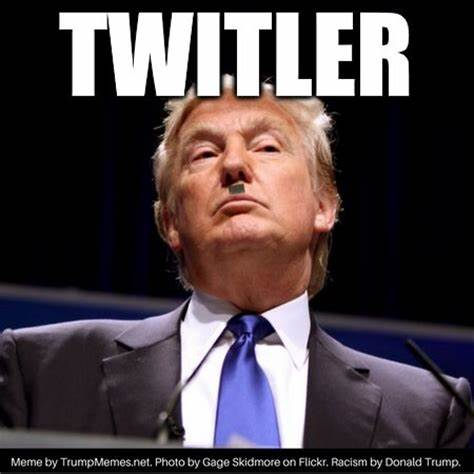It would be nice if journalists would take of the gloves and tell the humans to take out the trash.
“I’m going to surround myself only with the best and most serious people,” Trump told The Washington Post in August 2015. “We want top of the line professionals.”
Since then, it’s become clear Trump has a dubious understanding of “best.” At least 18 shady figures in the president’s orbit have either been arrested or gone to jail since he took office, on charges from fraud to battery to child pornography. While many of those charges stem from former Special Counsel Robert Mueller’s investigation into Russian election interference in 2016, several other politicians and donors have been convicted of crimes unrelated to the president.
Here are all the Trumpworld figures who have been arrested, indicted, or locked up:
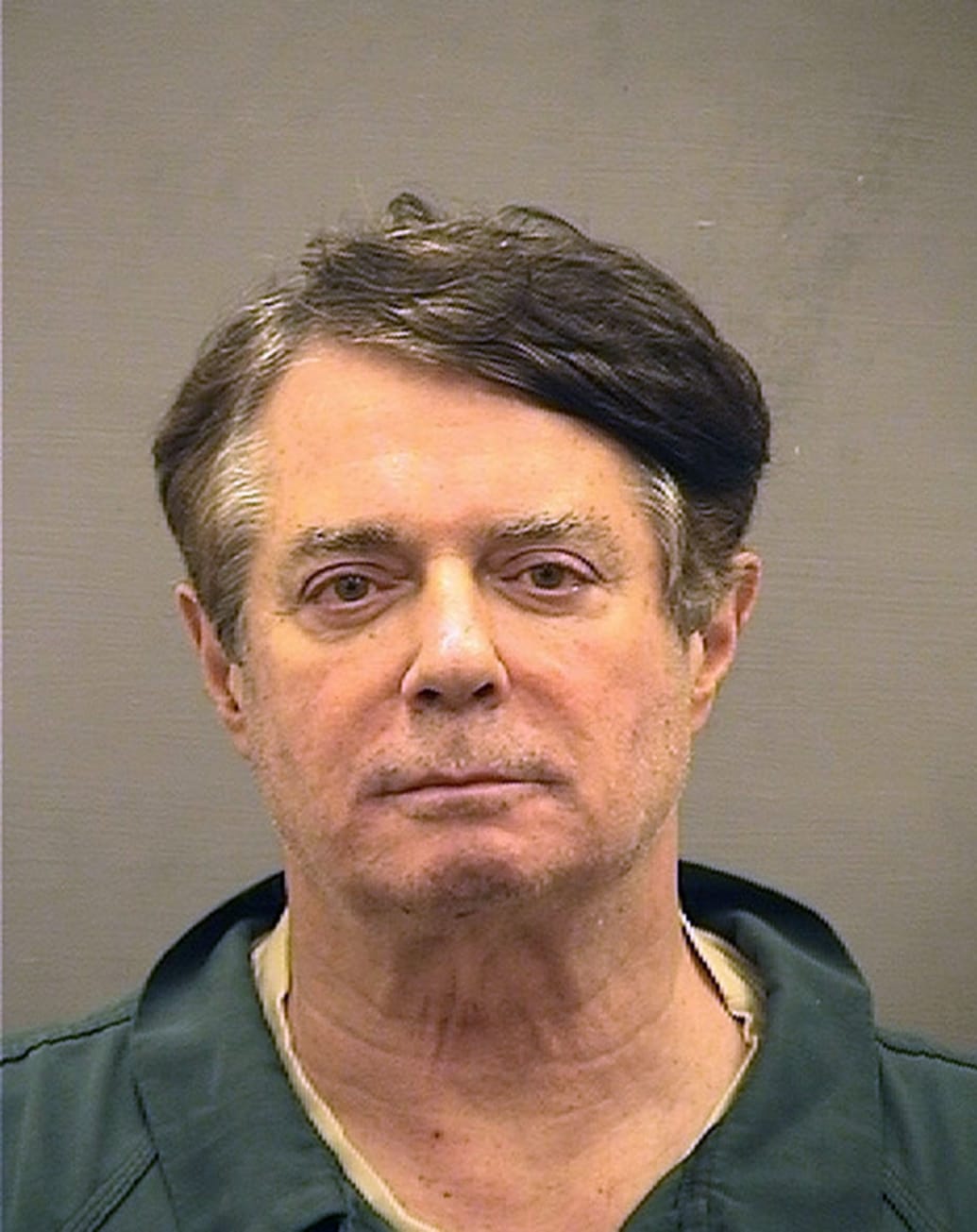
Courtesy Alexandria Sheriff's Office
Paul Manafort
Paul Manafort, Trump’s former campaign chairman, was sentenced in March to more than seven years in prison after being convicted of charges stemming from two separate cases brought by Special Counsel Mueller. Minutes after he was sentenced in federal court, the Manhattan District Attorney’s Office indicted him on 16 additional charges, including residential mortgage fraud and falsifying business records. This month, a New York court upheld a trial judge’s ruling that the fraud charges should be tossed because they violate the state’s double-jeopardy law.
Manafort, who worked for Trump’s campaign for five months in 2016, was convicted in August 2018 on eight counts of financial-related crimes for using foreign accounts to hide the millions he earned from political consulting work for former Ukraine President Viktor Yanukovych. About a month later, Manafort pleaded guilty to 10 other charges in federal court in Washington, D.C., and agreed to cooperate with the Mueller probe. A federal judge ultimately ruled Manafort violated his plea agreement with the government by repeatedly lying to Mueller’s investigators about his Russian contacts before and after the 2016 election.
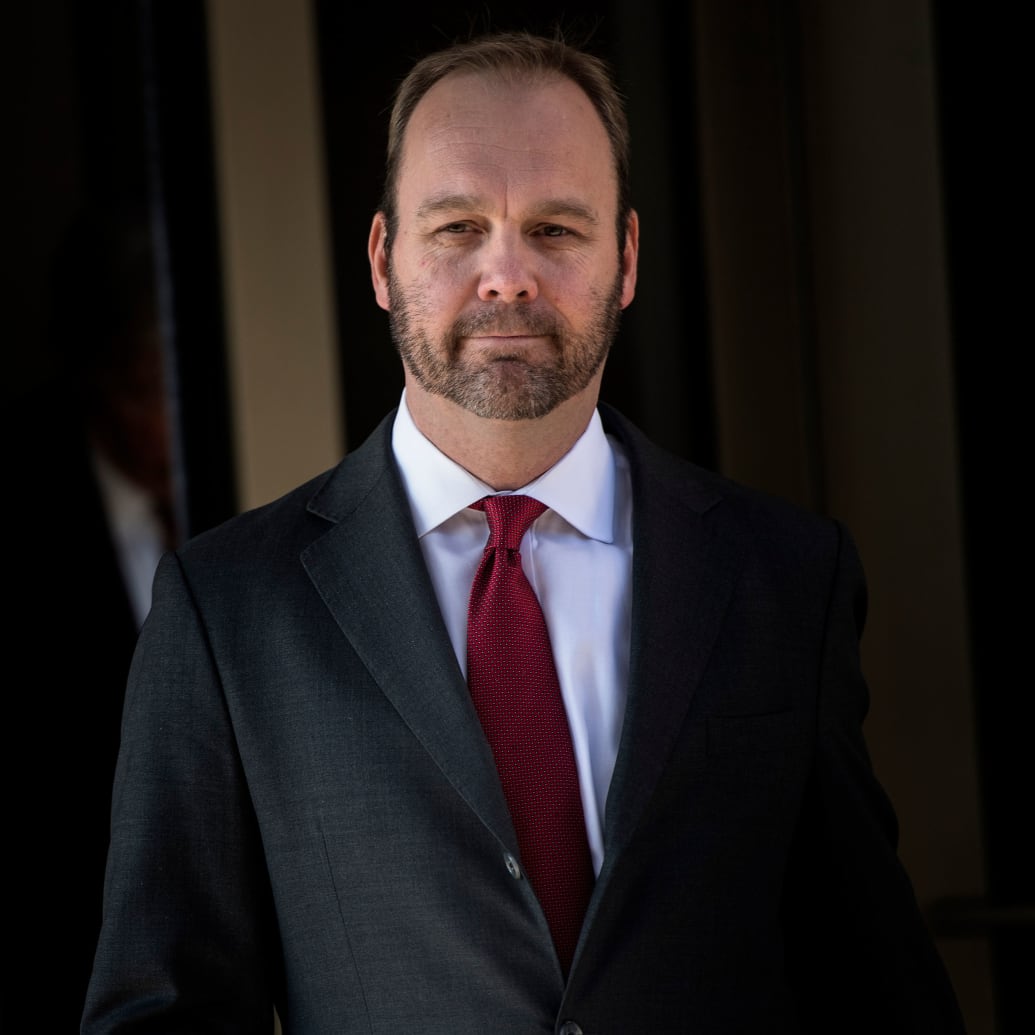
Brendan Smialowski/Getty
Rick Gates
Rick Gates, a former Trump campaign official, was sentenced to three years of probation and 45 days in jail last December after famously flipping on the president during the Mueller investigation. As part of a plea deal, the longtime Manafort deputy admitted to several crimes, including conspiracy and lying to investigators. Gates gave the Mueller team key insights into the Trump campaign’s actions during the 2016 election and admitted to helping Manafort conceal millions in foreign bank accounts that the pair earned from work in Ukraine.
Gates, who was originally charged with lobbying violations and tax and bank fraud alongside his boss, also spilled on how Manafort had instructed him to periodically contact one individual—whose name is redacted in FBI documents—to gain information about when hacked Democratic emails would be published.
The one-time Republican operative also testified in Manafort and Roger Stone’s trials. Under cross-examination in Manafort’s Virginia tax and bank fraud trial, Gates stared at his former mentor and explained his decision. “Mr. Manafort had the same path. I’m here,” he said, as his voice shook. “I am trying to change. I am taking responsibility.”
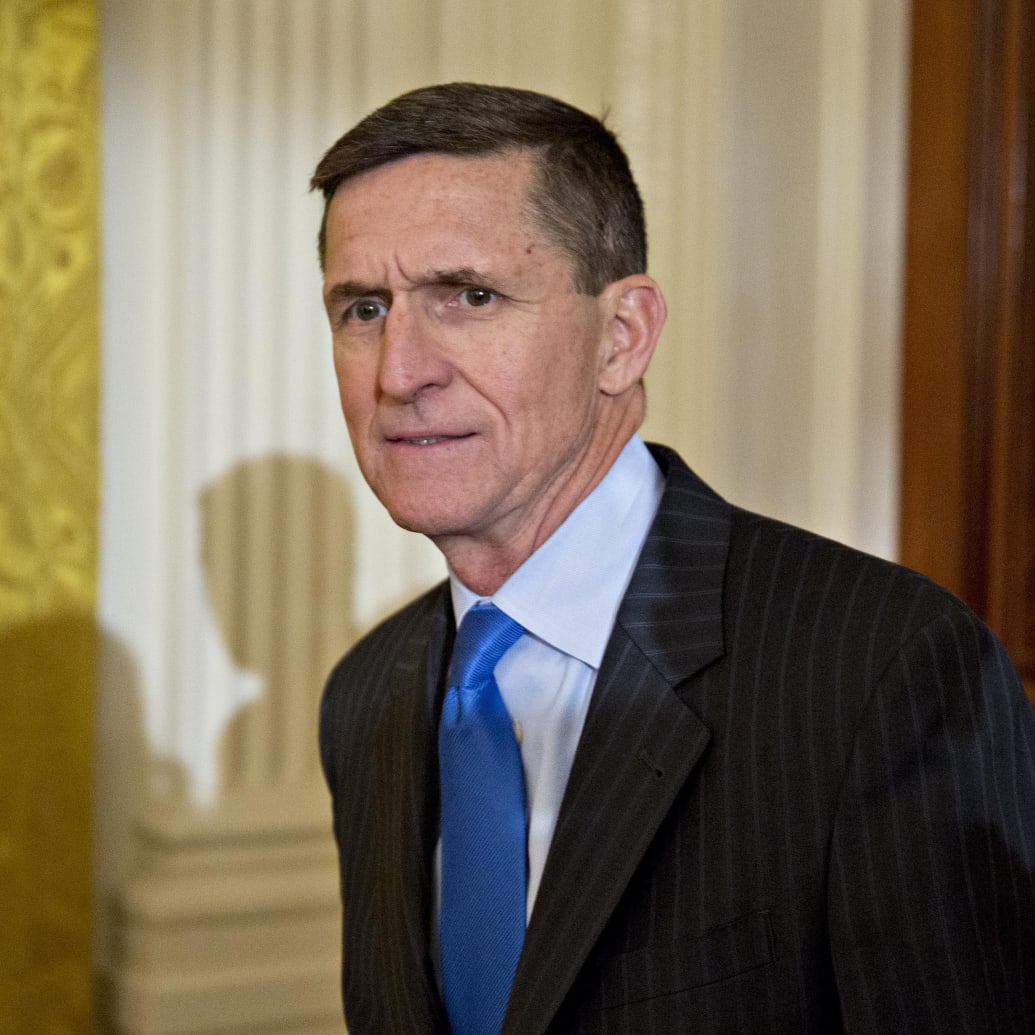
Andrew Harrer-Pool/Getty
Lt. Gen. Michael Flynn
Former National Security Adviser Michael Flynn flipped on the Trump campaign in December 2017 after pleading guilty to making false statements about his conversations with Russia’s ambassador to the United States weeks before the inauguration.
While he served as Trump’s national security adviser, the former three-star Army general denied asking then-Russian Ambassador Sergey Kislyak to “refrain from escalating in response to [American] sanctions” the Obama administration had imposed on Moscow for meddling in the 2016 presidential election. Flynn also denied having asked Kislyak to delay a United Nations Security Council vote on Israeli settlements. Both lies were made during an interview with FBI agents on Jan. 24, 2017, the feds said.
Though Flynn agreed to cooperate with Mueller in 2017, the Trumpkin reversed his posture two years later—claiming he was coerced into a guilty plea by prosecutors and federal agents. Earlier this year, Attorney General William Barr appointed a U.S. attorney to review the case and even moved in May to dismiss the charges altogether. Refusing to give in to outside pressure, a federal judge presiding over the case appointed an outside adviser to argue against dismissal, and the case is still alive.
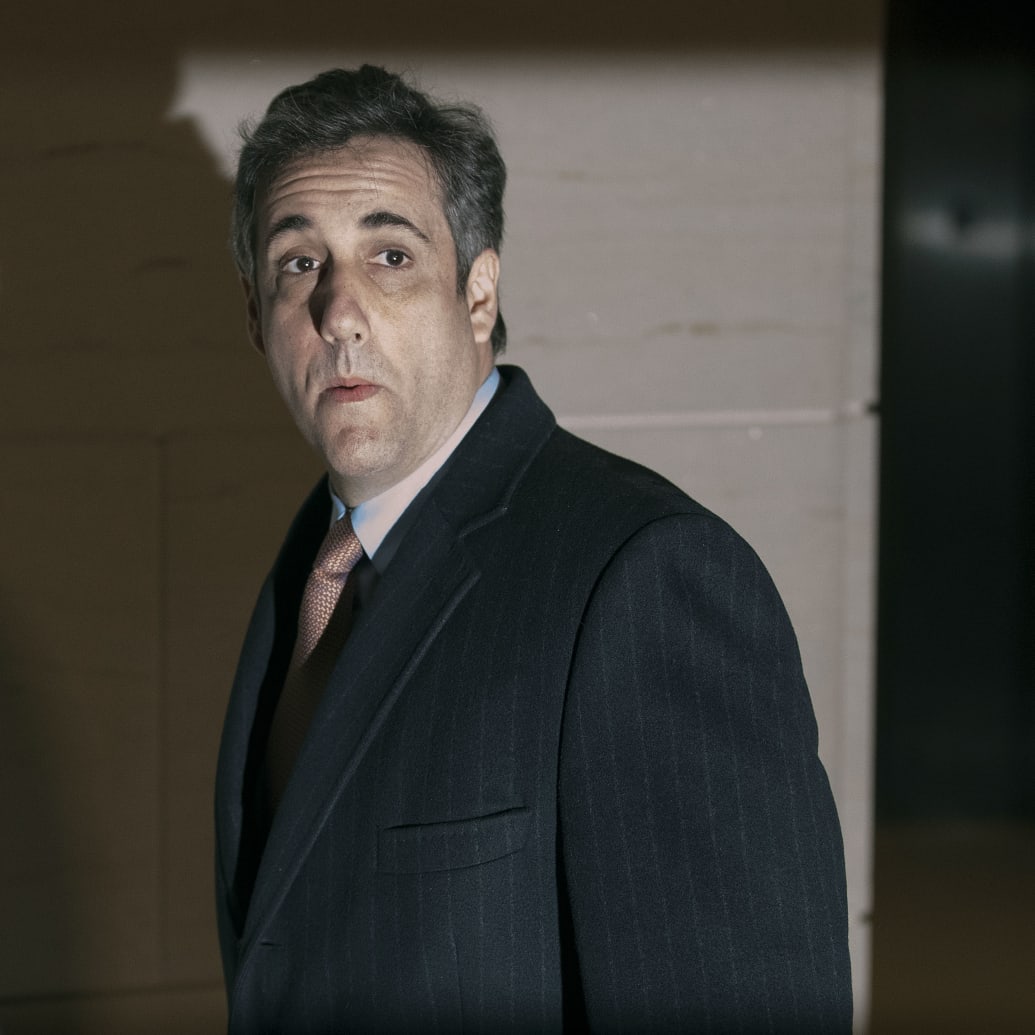
Chip Somodevilla/Getty
Michael Cohen
Michael Cohen, the president’s former fixer, was sentenced in 2018 to three years in prison after pleading guilty to lying to Congress about hush-money payments and plans to build a Trump Tower in Moscow.
While refusing to sign a cooperation agreement, the president’s former personal lawyer agreed to help with ongoing investigations. In the case brought by Manhattan federal prosecutors, Cohen admitted to breaking campaign finance law by doling out hush money to adult-film star Stormy Daniels and Karen McDougal, who claim they had affairs with Trump. In the case brought by Mueller, Cohen admitted to lying to Congress about the extent of the plans for a Trump Tower in Moscow in 2016 and responses from the Kremlin about the foreign project.
In May, a judge allowed Cohen to serve the remainder of his time behind bars in home confinement due to concerns about the coronavirus pandemic. But on July 9, he was sent back to prison after questioning an agreement that barred him from publishing a tell-all book, his legal team said. Cohen sued Attorney General William Barr and the Bureau of Prisons director and was released from prison after a federal judge ruled he was “retaliated” against. He has since launched a podcast, “Mea Culpa,” as part of his “mission to right the wrongs he perpetuated on behalf of his boss.”
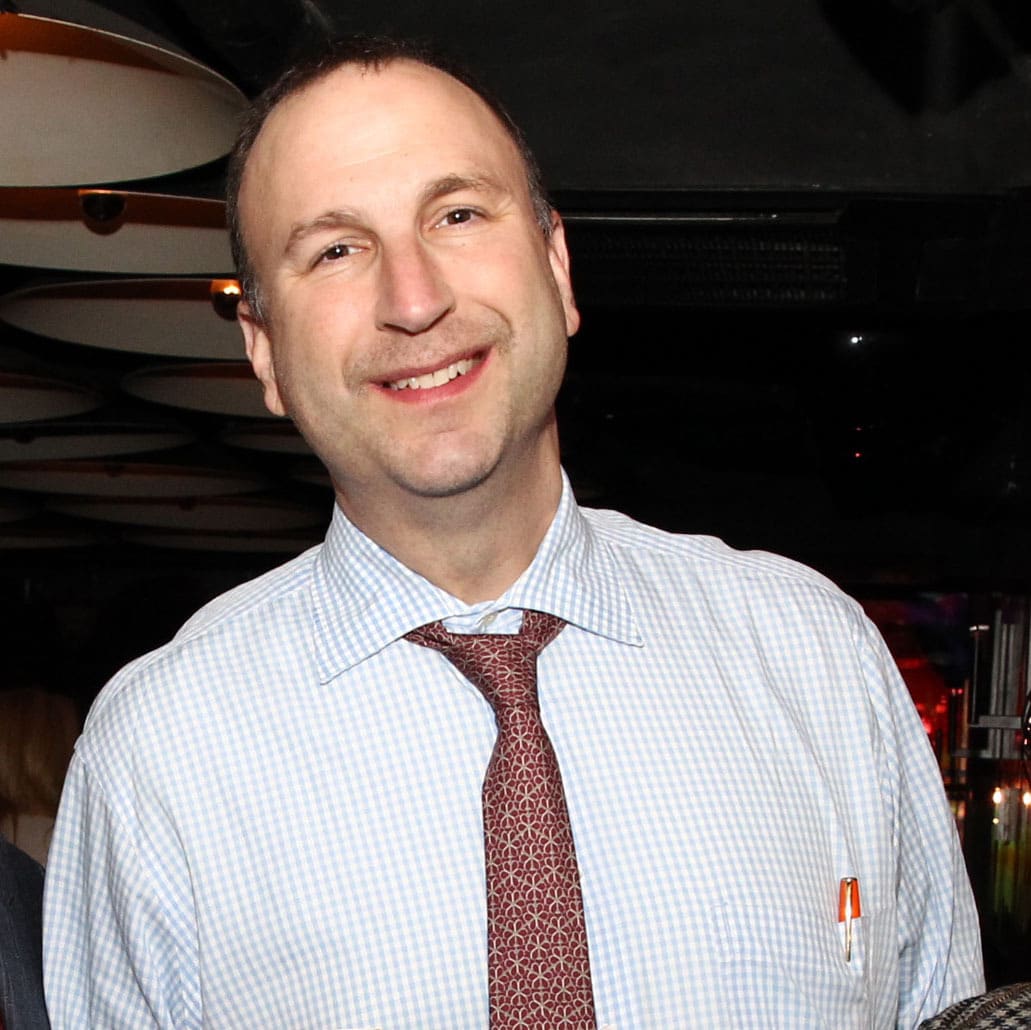
Astrid Stawiarz/Getty Images for DuJour
Ken Kurson
Ken Kurson, a close friend of Trump’s son-in-law Jared Kushner and the president’s former speechwriter, was arrested in October on cyberstalking charges in New York.
Federal prosecutors allege Kurson, a cryptocurrency entrepreneur who was once the editor-in-chief of the New York Observer, stalked and harassed at least three people including a former friend he blamed for ruining his marriage.
Authorities allege Kurson repeatedly visited his victims at work, made false complaints to their employers, and engaged in “malicious cyber activity” that came to light in 2018 while he was being vetted by the FBI for an unpaid advisory role in the Trump administration. Kurson was also once a close confidant of Trump’s personal lawyer Rudy Giuliani.
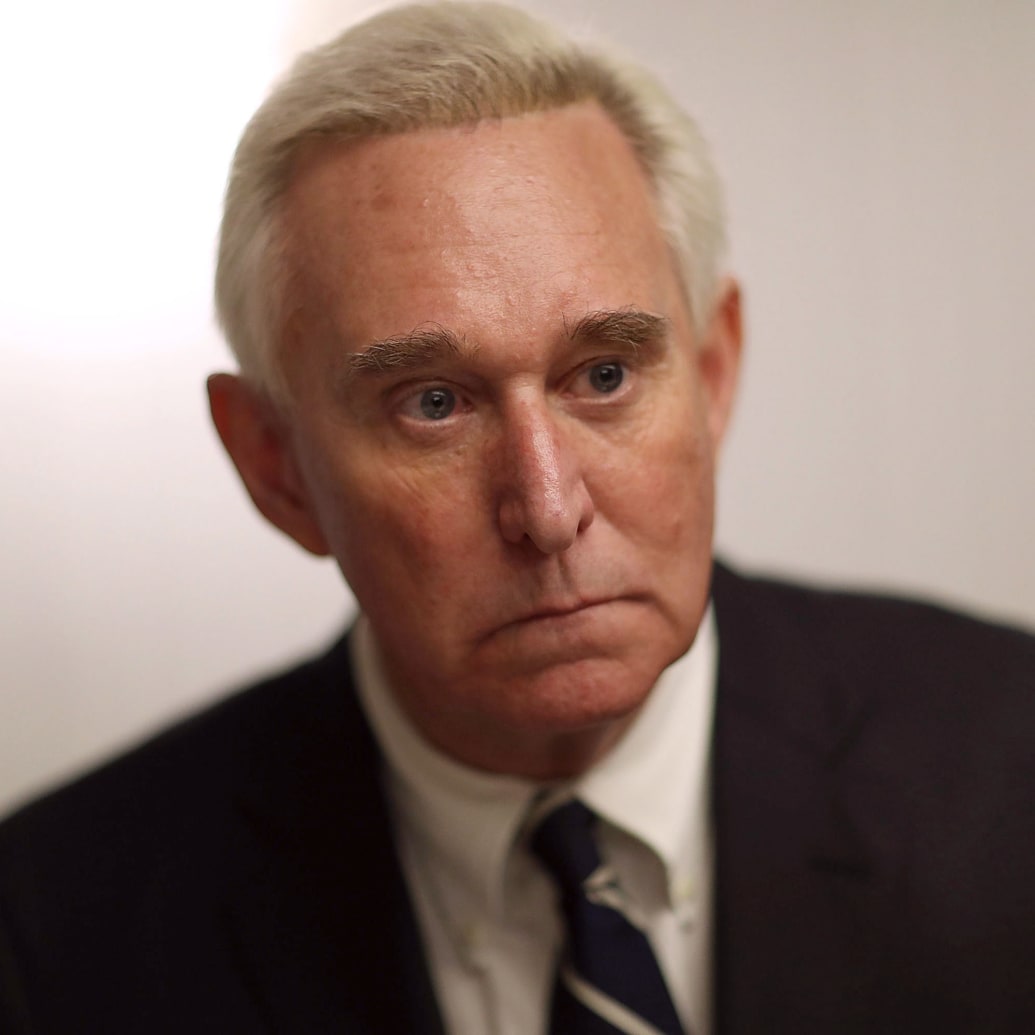
Joe Raedle/Getty
Roger Stone
Roger Stone, a longtime Trump confidant convicted of lying to Congress about his connection to WikiLeaks and intimidating another witness to do the same, received a presidential pardon in July just before he was set to report to jail. Last year, Stone was convicted and sentenced to 40 months in prison on several charges—the last to be filed before Mueller’s probe ended.
The longtime Republican operative, who worked on Nixon’s 1972 campaign and served as a lobbyist for Trump’s casino business, was one of the first people to join the president’s campaign after he formally announced in June 2015. Although he left just two months later, several former officials of Trump’s inner circle testified Stone was still involved behind the scenes. During the trial, prosecutors argued Stone was viewed as the campaign’s “access point” to WikiLeaks and founder Julian Assange, and the connection was crucial to gleaning information about the anti-secrecy group’s plans to publish hacked Democratic National Committee emails.
In a statement announcing Stone's clemency on July 10, the White House described Stone as “a victim of the Russia Hoax that the Left and its allies in the media perpetuated for years in an attempt to undermine the Trump Presidency.”
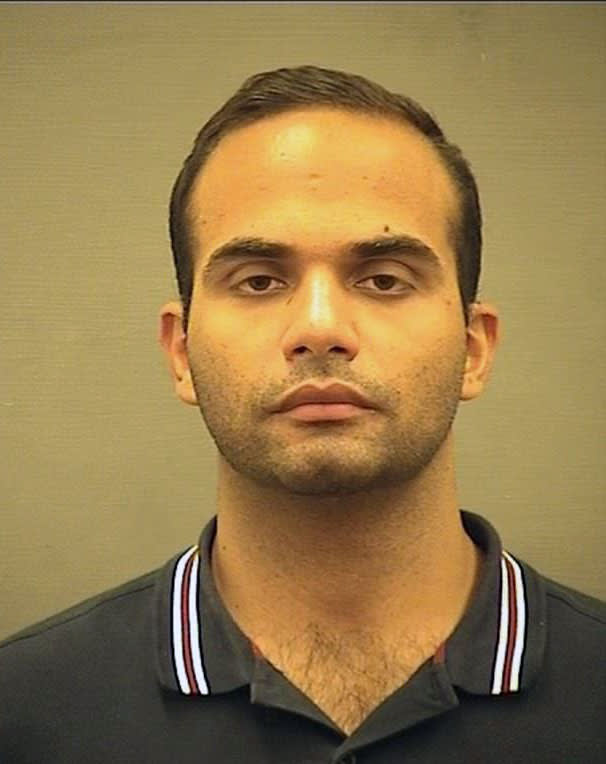
Alexandria Sheriff's Office
George Papadopoulos
George Papadopoulos, a former Trump campaign aide, was sentenced in 2018 to 14 days in jail and fined nearly $10,000 for lying to the FBI during interviews about his contacts with Russians during the election.
The first Trumpkin to be sentenced as part of Mueller’s probe, Papadopoulos served 12 days of his sentence after pleading guilty. During a January 2017 meeting, according to HuffPost, Papadopoulos told federal investigators that he learned that the Russians had dirt on Hillary Clinton before joining the real-estate mogul’s campaign—which he reportedly called a “very strange coincidence.” The lie hindered federal prosecutors from arresting a suspected Russian operative who later fled the country.
In his sentencing memo, Mueller’s team wrote that Papadopoulos’ offense was “serious and caused damage to the government’s investigation.” After his arrest, Trump advisers tried to downplay his role in the campaign, insisting he was just a “coffee boy.” Later, Trump called Papadopoulos a “low-level volunteer.”
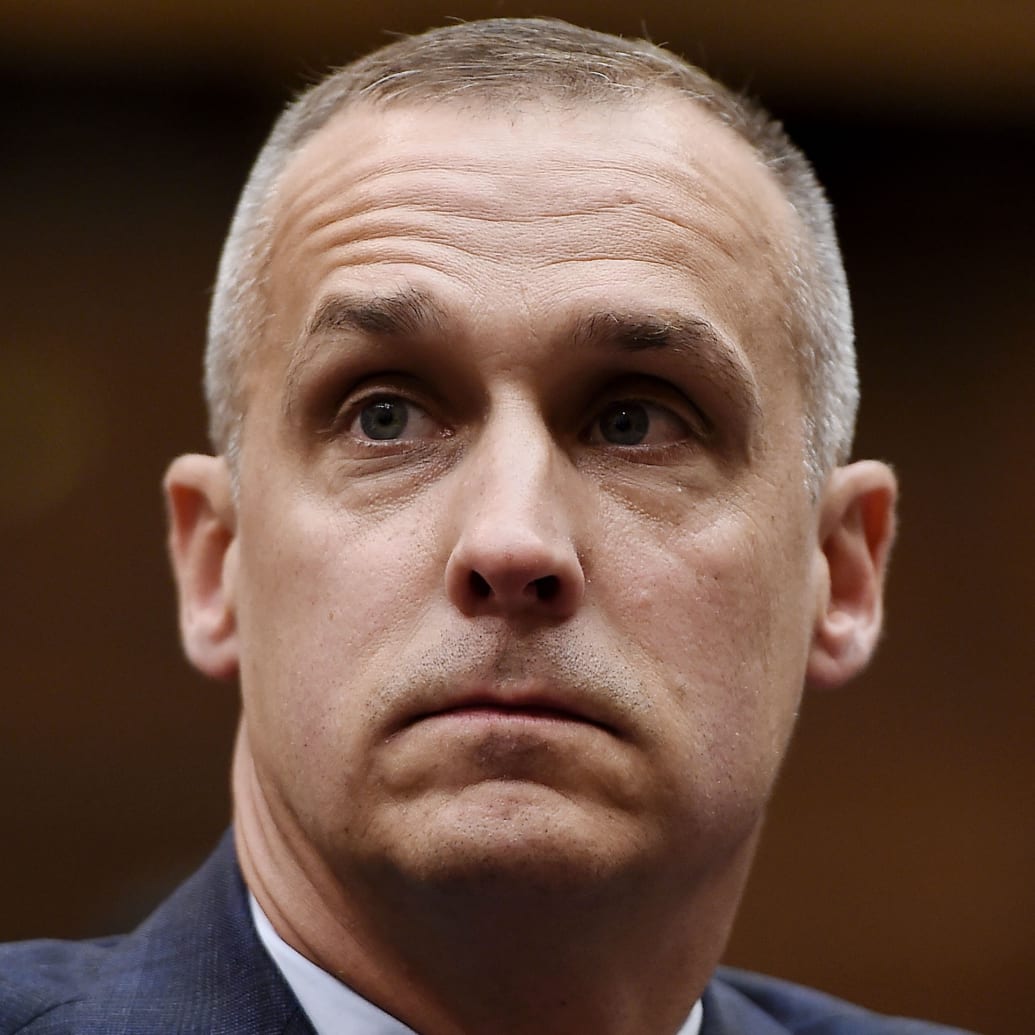
Oliver Douliery/Getty
Corey Lewandowski
Corey Lewandowski, who served as Trump’s campaign manager during the 2016 election, was charged in March 2016 with misdemeanor simple battery after allegedly grabbing the arm of a former Breitbart reporter at a Florida campaign event. Surveillance video of the incident showed Lewandowski grabbing Michelle Fields’ arm with his right hand as she held up her phone to ask Trump a question while leaving a press conference. The action, authorities said, caused Fields “to turn and step back,” clearing a “path for Lewandowski to walk past Fields, allowing him to ‘catch up’ and get closer to Trump, who was walking during this entire incident.” Ultimately, the charges against Lewandowski were dropped, with Palm Beach County prosecutors writing in a court filing that “the evidence cannot prove all legally required elements of the crime alleged and is insufficient to support a criminal prosecution.”
Lewandowski has also been accused of unwanted touching by singer Joy Villa—a Trump supporter best known for wearing a MAGA dress to the 2017 Grammy Awards—and calling a female co-worker a “fucking bitch.” While Lewandowski was fired from the Trump campaign in June 2016, he is currently a Trump campaign adviser.

930229872
Sylvain Lefevre/Getty
Steve Bannon
Steve Bannon, former chief strategist to President Donald Trump, was arrested in August for allegedly using profits from the viral “We Build the Wall” fundraising campaign to enrich himself. New York prosecutors allege Bannon and three others stole upwards of $25 million worth of donations from hundreds of thousands of donors. Instead of using the money to support Trump’s border wall dreams, prosecutors allege the men used the money on luxury cars, home renovations, cosmetic surgery, and a 2019 Jupiter Marine boat named Warfighter.
Prosecutors allege Bannon personally skimmed over $1 million to put toward personal expenses and secretly pay “We Build the Wall” founder Brian Kolfage, who had promised not to take a dime from the fundraiser. Bannon, who came to prominence as the leader of Breitbart before joining the Trump campaign, pleaded not guilty to both counts in New York federal court. He was released after posting a $5 million bond. Since his arrest, Trump has distanced himself from Bannon, calling the fundraiser “inappropriate” and insisting he hasn’t dealt with Bannon in “a very long time.”
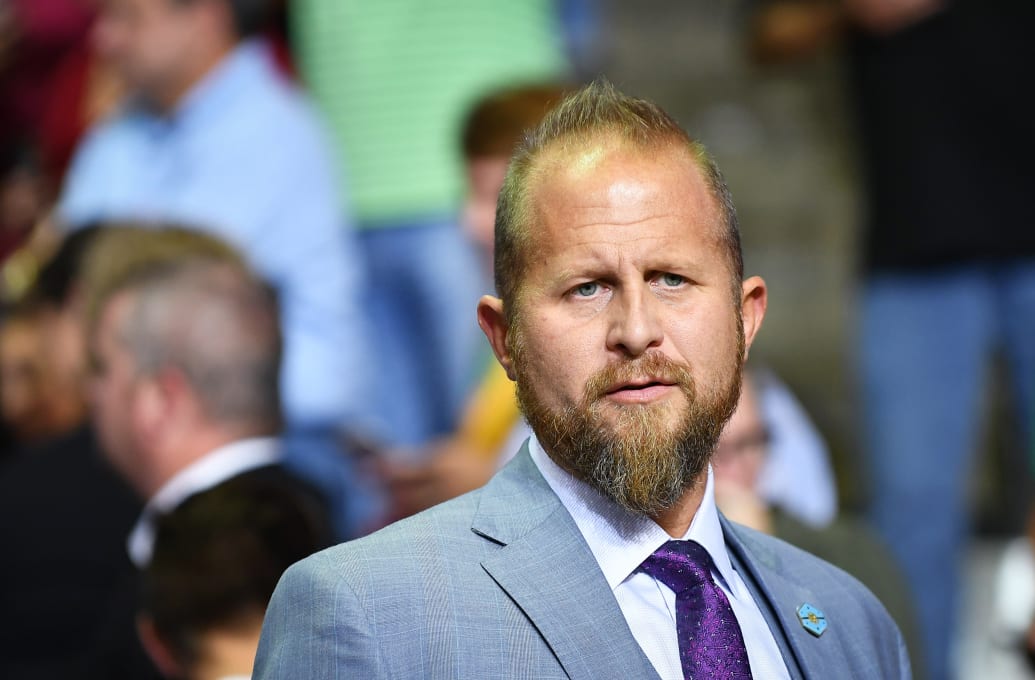
1044843670
Mandel Ngan/Getty
Brad Parscale
Brad Parscale, Trump’s former 2020 campaign manager, was arrested in September after his wife called police to report that he planned to harm himself. According to the police report, Parscale’s wife also said he pulled out a loaded firearm in front of her and physically assaulted her during a prior dispute. After a three-hour standoff with Fort Lauderdale police, Parscale was detained and taken to Broward Health Medical Center for psychiatric evaluation under the state’s Baker Act. Authorities seized 10 firearms from his house.
Following the exchange, which was recorded on body-camera footage, Parscale announced that he would resign from his position as a senior adviser, citing “overwhelming stress.”
The former campaign manager is also under investigation over his use of millions of dollars of campaign funds.
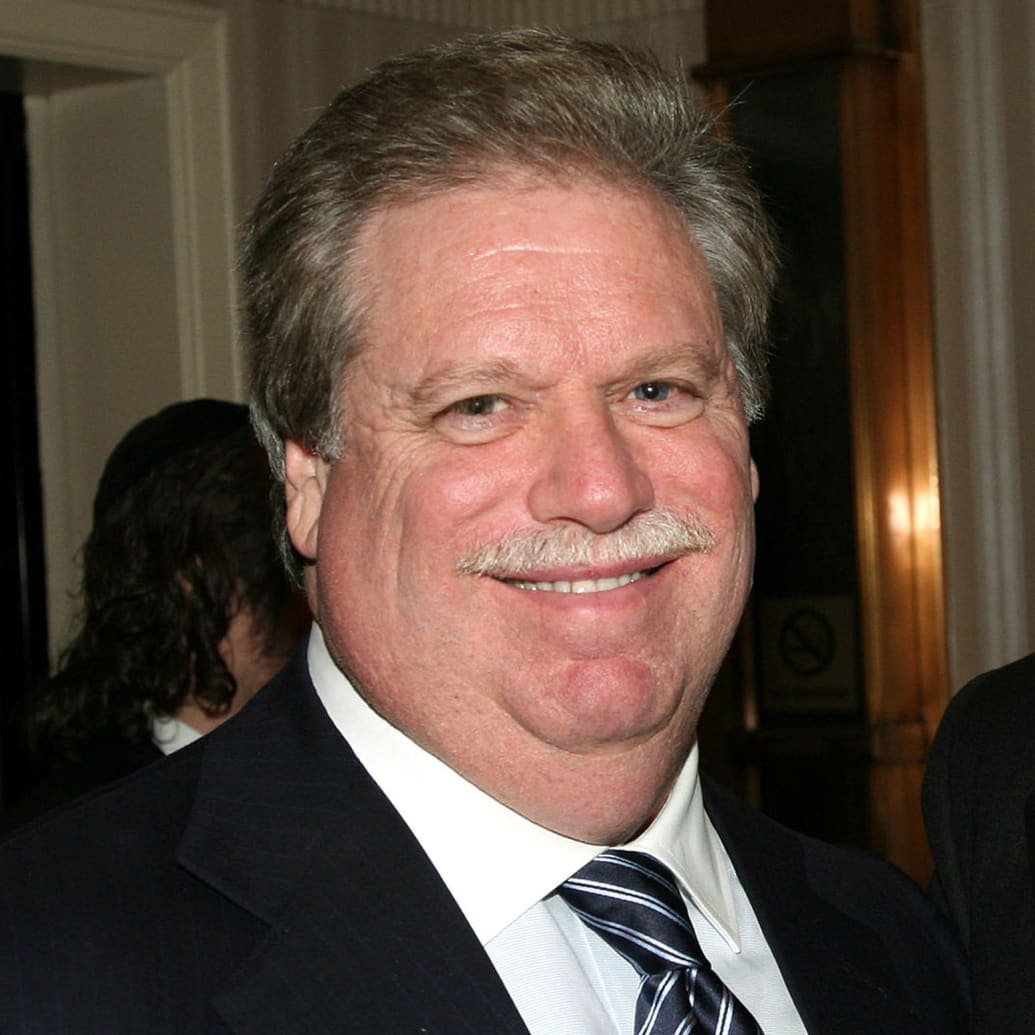
David Karp/AP
Elliott Broidy
Elliott Broidy, a former high-dollar Trump fundraiser, pleaded guilty this month to conspiring to influence the president’s administration on behalf of Chinese and Malaysian interests. Federal prosecutors state that as part of his plea agreement, Broidy admitted he accepted millions to lobby Trump, the U.S. attorney general, and other administration officials to drop or reduce its criminal probe into Jho Low. Low is accused of orchestrating a multibillion-dollar fraud against a Malaysian government investment fund. Despite the millions in bribes, the former top fundraising official for the Republican National Committee was unsuccessful in his lobbying efforts. Broidy resigned from his post at the RNC in 2018 after it was revealed he had enlisted Michael Cohen to pay hush money to a mistress.
Broidy, who allegedly conspired in the scheme with a Hawaii businesswoman, also agreed to forfeit $6.6 million to the federal government and to cooperate with prosecutors on several potential investigations related to his fellow conspirators.
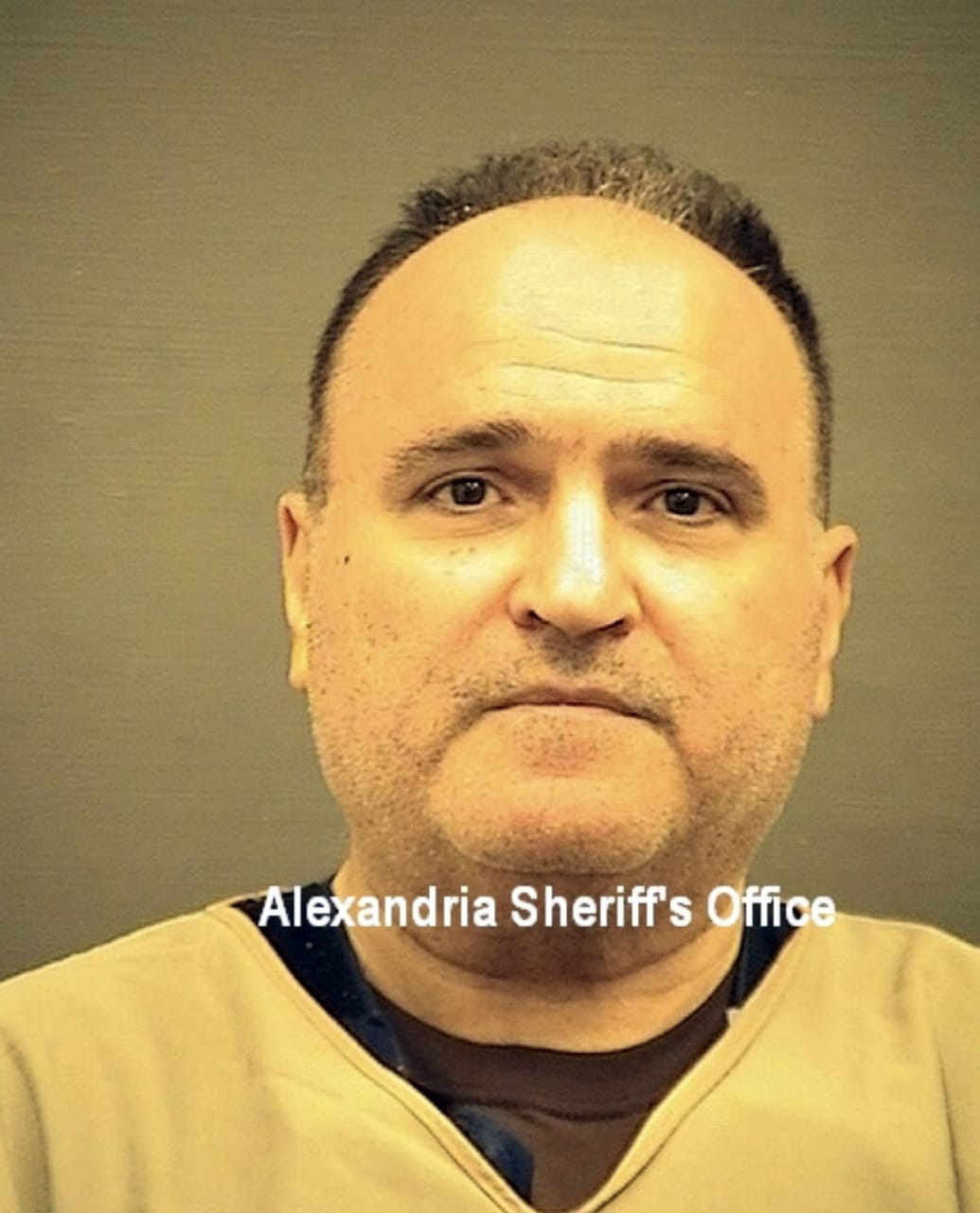
Alexandria Sheriff's Office
George Nader
George Nader, a Lebanese American businessman who served as a key witness in Mueller’s investigation, was sentenced to 10 years in prison in June after pleading guilty to child porn and child sex-trafficking charges. Authorities say Nader admitted to arranging for a 14-year-old boy from the Czech Republic to come to his Washington, D.C., home for sex in 2000, and to possessing child porn. As part of his punishment, he agreed to pay the victim $150,000 in restitution and a fine of $25,000. He is also facing charges in Washington, D.C., for allegedly aiding illegal foreign contributions to both Hillary Clinton’s campaign in 2016 and Donald Trump’s inaugural fund.
While serving as an adviser to the United Arab Emirates, Nader met with Trump officials and associates early on in the administration and allegedly attended a meeting at Trump Tower with Jared Kushner, Steve Bannon, and the UAE crown prince. According to the Mueller report, Nader also allegedly used his connections with the Kremlin to serve as an intermediary between Russians and Trump’s associates.

via Twitter
Imaad Zuberi
Imaaz Zuberi, a Los Angeles financier who donated $900,000 to President Donald Trump’s inaugural committee, pleaded guilty last October to falsifying records to hide his work as a foreign agent while he lobbied prominent U.S. government officials. Zuberi, whose real name is Shah Zuberi, is also expected to plead guilty in New York to obstructing a federal investigation into donations to Trump’s inaugural committee.
Last October, Zuberi pleaded guilty to three counts in Los Angeles for making nearly $1 million in illegal campaign contributions, engaging in various lobbying efforts, and evading taxes. Los Angeles prosecutors accused Zuberi of taking millions of dollars meant for campaign contributions and lobbyist campaigns for his personal use. In January, Zuberi agreed to plead guilty to obstruction after New York prosecutors alleged the financier took steps to block the investigation into Trump’s inaugural committee, including back-dating checks and deleting emails showing a $5.8 million transfer from a foreign national around the time of his political donation.
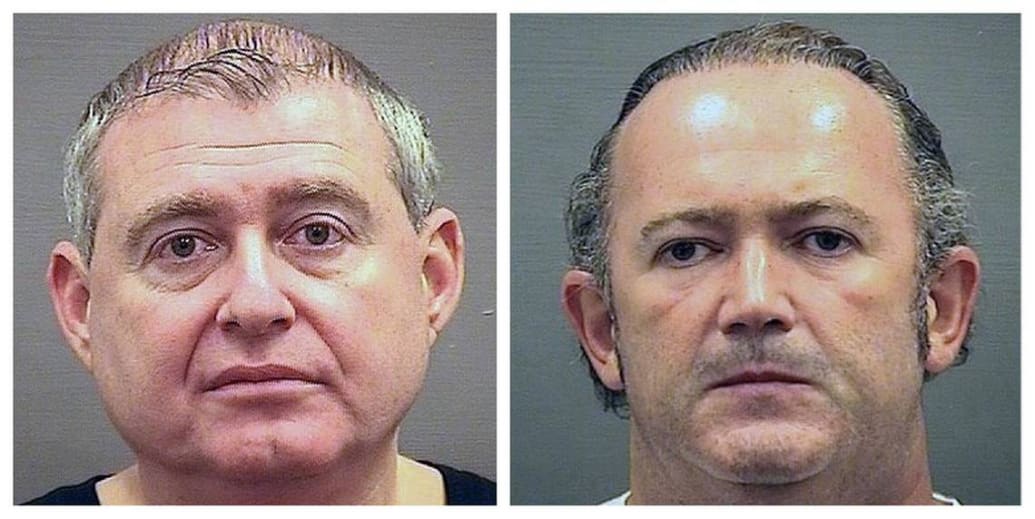
Alexandria Sheriff's Office
Lev Parnas and Igor Fruman
Lev Parnas and Igor Fruman, two Soviet-born businessmen with ties to former New York Mayor Rudy Giuliani, were arrested last October for allegedly violating campaign-finance laws through a six-figure donation they facilitated to Trump’s official super PAC. The case was the first criminal prosecution related to an apparent Trumpworld pressure campaign to coerce Ukrainian officials into digging up dirt on Trump’s political opponents for the 2020 re-election campaign. The scheme, which included tracking down damaging information on former Vice President Joe Biden, was at the center of the failed impeachment inquiry.
The pair pleaded not guilty to a four-count indictment that accused them of making illegal straw donations, including a $325,000 contribution to the group America First Action, which was first reported by The Daily Beast. That donation came from an entirely different, undisclosed company owned by Parnas. It is illegal to donate to federal political candidates in the name of another person or entity. In September, Parnas and David Correia, another former Giuliani associate, were charged with conspiring to defraud investors via an insurance company, lying to the Federal Elections Commission, and falsifying records.
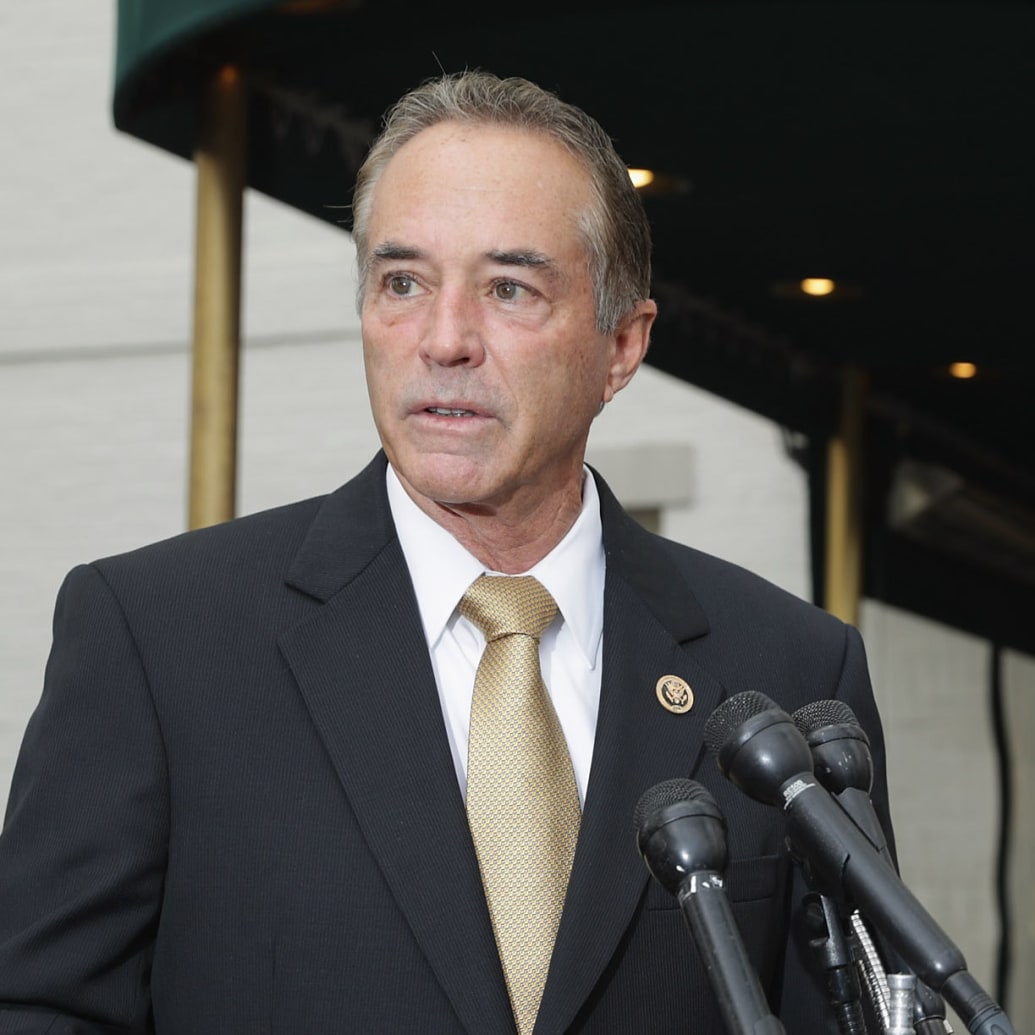
Chip Somodevilla/Getty
Rep. Chris Collins
Former New York Rep. Chris Collins was sentenced to 26 months in prison in January after slipping his son an illegal tip about a biotechnology company’s failed drug trial and later lying to authorities about it. Collins, who was the first member of Congress to endorse Trump in 2016 and remained a staunch supporter, pleaded guilty to one count of conspiracy to commit securities fraud and one count of lying to the FBI.
Authorities say that while at a congressional picnic at the White House a year prior, Collins was notified as a board member of Innate Immunotherapeutics that their multiple sclerosis drug had failed a critical trial. Collins then called his son, Cameron, and told him about the trial, prompting him to sell off over 1.3 million shares in Innate and tell his fiancée’s father about the development. The younger Collins and his future father-in-law also pleaded guilty in the case.
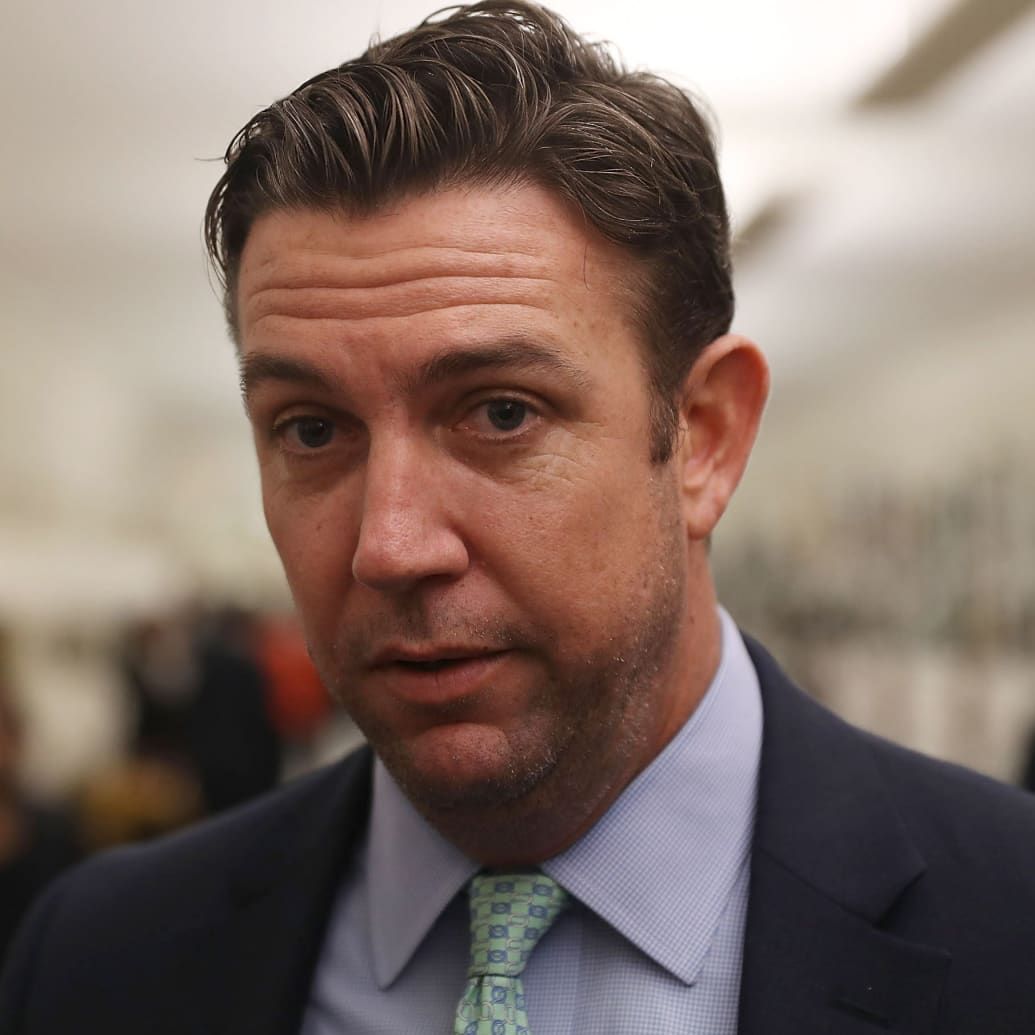
Joe Raedle/Getty
Former Rep. Duncan Hunter
Former California Rep. Duncan Hunter was sentenced to 11 months in prison and three years of parole in March after admitting he stole hundreds of thousands of dollars in campaign funds to enrich himself. Prosecutors said Hunter, who endorsed Trump for president in 2016, and his wife spent approximately $250,000 in campaign funds on personal expenses—including vacations and credit-card payments—and falsifying Federal Election Commission reports to cover their tracks. The former Republican congressman used some of the funds to pay for “intimate” encounters with several women, including an aide to a member of the GOP leadership team. Hunter, who pleaded guilty in December to one count of corruption, was also ordered to undergo a drug and alcohol treatment program.
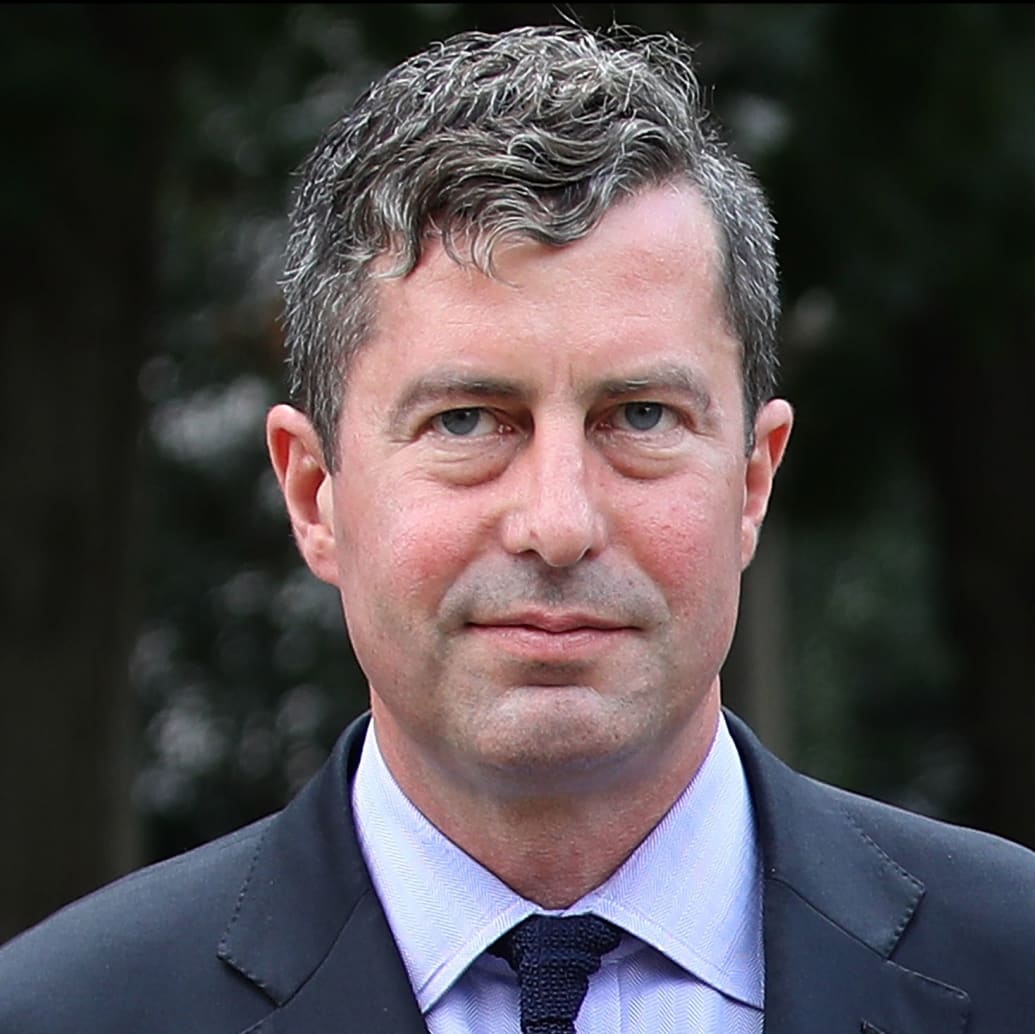
Win McNamee/Getty
Sam Patten
Sam Patten, a Republican lobbyist and operative who previously worked alongside Trump campaign data firm Cambridge Analytica, was sentenced to probation last April after admitting to trying to buy Trump inaugural tickets for a Ukrainian oligarch. Under the plea deal, which grew out of Mueller’s investigation and helped Patten avoid jail time, the operative was prepared to testify against Manafort, whom he knew from his years working in Ukraine.
Patten admitted he sought four inauguration tickets on behalf of an unnamed foreign individual—for $50,000—and used another American to serve as a “straw purchase.” The transaction was made despite federal laws prohibiting foreign nationals from donating to U.S. political groups and U.S. citizens from knowingly making political contributions in another’s name. The charges, described as violations of the Foreign Agents Registration Act for Patten’s undisclosed work on behalf of a Ukrainian political party, were not brought directly by Mueller’s team.

